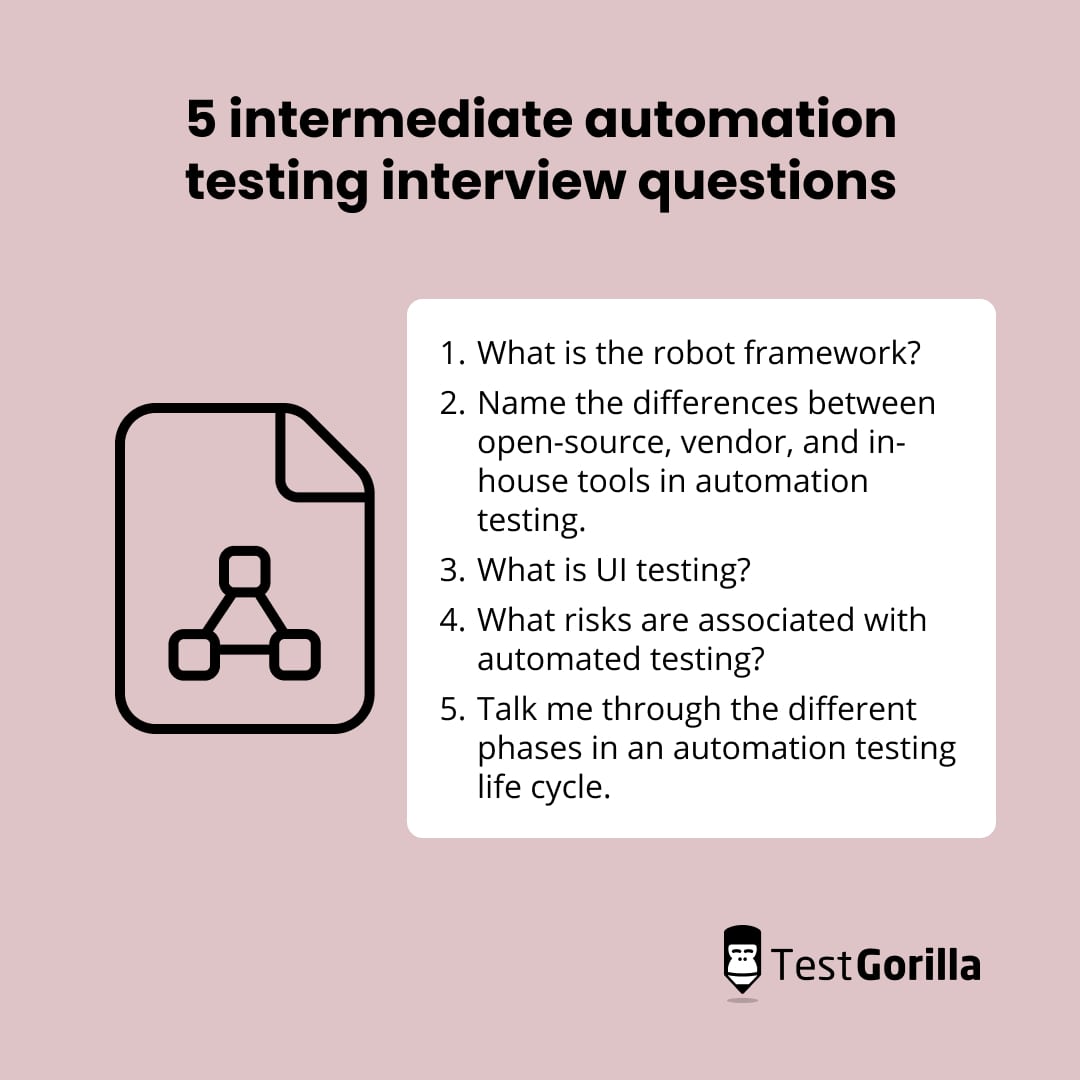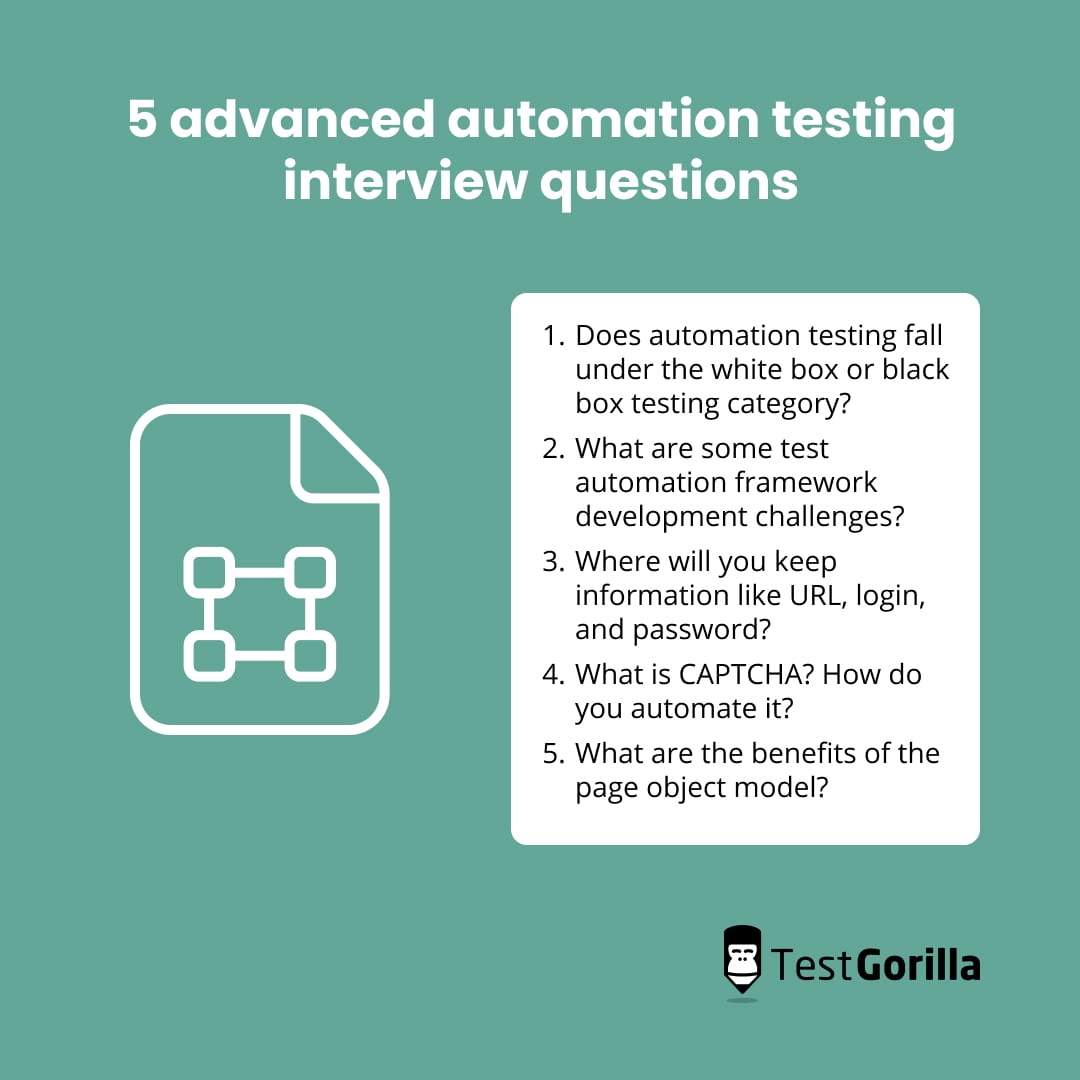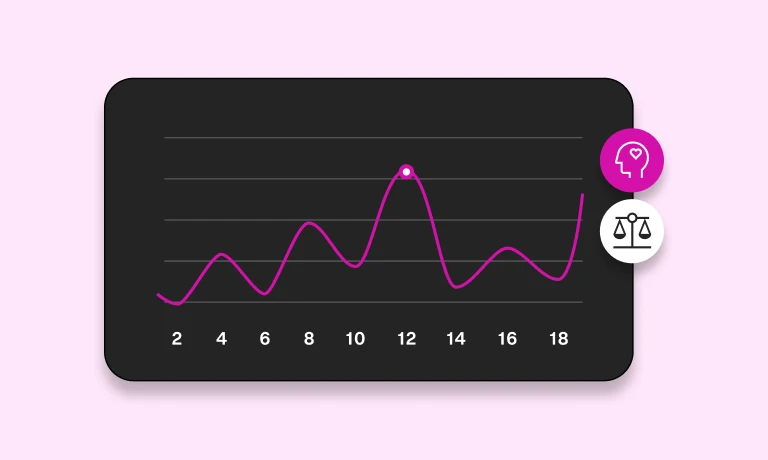50+ automation testing interview questions to ask software engineers
Automation testing plays an important role in the software development life cycle. Technology is constantly evolving, meaning more jobs will require talented software engineers. You can hire these tech professionals by conducting engaging and purposeful interviews that help you assess their skills, work experience, and knowledge of test automation. Although finding a relevant test is straightforward, asking the right interview questions isn’t always easy.
Where can you find suitable interview questions? How do you structure an interview to hire software engineers? Don’t fret, because we have you covered. In our guide, find 50+ automation testing interview questions and sample answers to refer to after finishing your interviews.
Table of contents
- 15 general automation testing interview questions
- 5 general automation testing interview questions and sample answers
- 25 intermediate automation testing interview questions
- 5 intermediate automation testing interview questions and sample answers
- 14 advanced automation testing interview questions
- 5 advanced automation testing interview questions and sample answers
- For what kind of roles can you use automation testing interview questions?
- When you should use skill assessments in your hiring process
- Hire talented software engineers using skill tests and automation testing interview questions
15 general automation testing interview questions
Check out these 15 general automation testing interview questions for candidates who don’t have much work experience and knowledge.
1. What is automation testing?
2. When would you automate a test?
3. Talk me through the steps of the automation process.
4. How do you plan the automation process?
5. What is a test script?
6. How do you select a good automation tool?
7. What are the types of automation testing?
8. What’s the difference between manual testing and automated testing?
9. When would you avoid automated testing?
10. Name the different parts of a test automation framework.
11. What is a test environment?
12. Explain some of the best practices in test automation.
13. What is automated regression testing?
14. Define cross-browser testing and how it works.
15. What is browser automation?
5 general automation testing interview questions and sample answers
Use these sample answers to general automation testing questions to compare responses after your interviews.
1. What is automation testing?
Automation testing is the process of testing software to identify if it functions properly or has any bugs. Many software engineers use this technique when evaluating the product’s outcome.
Even with minimal experience, beginner candidates should at least know what automation testing is. They should also mention the benefits of this process and how it differentiates from manual testing.
Some notable benefits of test automation include:
Quick feedback on specific products
Maximum test coverage
Cost-effective
Brand enhancement
Early detection of bugs
Reusable test cases
Saves time during development
Tests multiple products at once
Candidates should get a bonus point if they discuss automation testing in today’s technological industry.
2. Talk me through the steps of the automation process.
Beginner automation testers should know the steps of the automation process. Although all testers have their unique way of performing this software technique, the testing should be similar. Remember to note down their responses to better understand their methods and thoughts.
Below are common steps of the automation process:
Choose a test tool or framework to complete automation.
Define the scope of automation by evaluating the test case and noting down every step you make.
Write a custom script to ensure the test can run on any browser, website, or application.
Run the test to identify bugs or improvements.
Focus on making changes to the product.
You can send candidates a Critical Thinking test to determine how they evaluate information and think of innovative strategies. This assessment is especially important for software engineers who need to find ways to resolve bugs.
3. What’s the difference between manual testing and automated testing?
The software engineer performs each step without a test script in manual testing. This process can be tedious and more cost dependent if the testing doesn’t identify bugs during development. The engineer also takes the role of an end-user by testing the application’s features to ensure they behave correctly.
On the other hand, automation testing is highly reliable because it tests products using frameworks and tools. For example, Selenium is an automation tool that tests web browsers across different platforms.
Consider using a Selenium with Python test to evaluate the candidate’s ability to automate browsers and code with the Python programming language. You can also add more Python automation interview questions into the mix.
There are several types of automation testing that candidates should know about. Even if candidates lack experience, they must know how different testing techniques benefit the final product.
Here are the types of automation testing:
User interface (UI) tests: These determine whether the application provides a consistent user experience without facing graphical or visual bugs.
Regression tests: With these tests, engineers can ensure that the new code doesn’t interfere with existing features in the product.
Performance tests: By testing the function of the product, end users won’t experience bugs during later development. This test requires testers to assess the performance of applications and whether they can take heavy code.
Unit tests: Testers complete these tests to check small pieces of code in isolation to evaluate the behavior and performance.
Integration tests: This test measures how well software components work together, which can help software engineers identify problems early on.
5. Explain some of the best practices in test automation.
With automated testing, software development teams must follow suitable practices to build a high-quality product. Delving into tests without a proper plan and framework can cause more problems in the future. Therefore, candidates should know a few best practices when running these extensive tests.
Some of the most useful practices include:
Decide what you should automate beforehand
Choose suitable tools and frameworks to prevent wasted time and money
Store all records in a bug database or separate file
Add comments to explain improvements or performance issues
Follow language-specific coding methods when testing code
Test automated scripts regularly to ensure they’re operational
Identify reusable testing methods and write them down
Automated testing is becoming increasingly popular, so it’s important to hire candidates who know how to use automation tools and follow the best practices.
The best insights on HR and recruitment, delivered to your inbox.
Biweekly updates. No spam. Unsubscribe any time.
25 intermediate automation testing interview questions
Below are 25 intermediate automation testing questions you can ask more experienced candidates in the interview.
1. Who should be responsible for test automation?
2. Tell me the pros and cons of using Selenium.
3. What is UI testing?
4. What is a modular testing framework?
5. Name some of the most popular tools for automation testing.
6. Share a few examples of when you would use manual testing instead of automation testing.
7. Is documentation necessary in automation testing?
8. Explain the code-driven automation testing approach.
9. What programming languages would you use to implement graphical user interface (GUI) automation testing?
10. Talk me through the different phases in an automation testing life cycle.
11. What risks are associated with automated testing?
12. What is the robot framework?
13. What is a hybrid testing framework?
14. How do you map the success of automation?
15. Name the differences between open-source, vendor, and in-house tools in automation testing.
16. What is cucumber in automation testing?
17. Is it possible to achieve 100% automation?
18. What type of tests have you automated?
19. How many tests have you automated per day?
20. Have you created any frameworks?
21. What is the test automation pyramid?
22. What factors determine the effectiveness of automation testing?
23. Is automation testing useful in agile methodology?
24. How do you choose an automation testing approach?
25. What are the main features of a good automation testing strategy?
5 intermediate automation testing interview questions and sample answers
Use these intermediate sample answers when determining which candidates are qualified for the open position.
1. What is the robot framework?
Robot framework is an open-source testing framework that uses robotic process automation (RPA) to imitate human actions. To some extent, robot automation can understand links, code, and buttons when identifying bugs. Many companies rely on RPA because it is efficient and reliable in software testing.
Software engineers usually create the robot framework in Python due to the modular architecture and integration with other automation tools. Therefore, the ideal candidate should also have programming skills to complete specific tasks.
Upon starting tests, the robot framework generates detailed reports using a special syntax. You can find this syntax in Python’s test libraries.
Send candidates a Python Data Structures and Objects test to better understand their programming skills and knowledge of robotic process automation. This test is ideal for mid-level developers who have some experience with Python.
2. Name the differences between open-source, vendor, and in-house tools in automation testing.
Candidates with experience with test automation should understand what open-source, vendor, and in-house tools mean. The ideal candidate may explain what each of these does and state how they’re different.
Here are the definitions for each tool:
Open-source: These are free tools that don’t have a commercial license. Anyone can use them when sourcing code on the internet. For example, testers might use Selenium, the open-source testing tool, when testing web browser applications.
Vendor: Companies usually develop this tool, meaning they must buy the required license before using it. TestComplete is a popular vendor tool for desktop, mobile, and web development.
In-house: A company can create in-house tools unavailable to other organizations. Team members only use this tool for themselves during automated testing.
3. What is UI testing?
User interface testing ensures the application is intuitive and doesn’t produce bugs or glitches upon launch. Every user should have a consistent experience when navigating websites and apps. Therefore, conducting regular UI tests is essential for building a reliable product.
There are also many benefits of UI testing, which include:
More accuracy when noticing bugs
Faster response time
Increased coverage during automation
Limited room for human errors
The majority of first impressions of a company’s website relate to design and functionality. This research shows that users pay attention to their experience when using a website. Not investing in UI testing could result in poor design, navigation, security, and performance.
4. What risks are associated with automated testing?
Automation testing has a few risks that could hinder product development. Candidates should understand these risks if they have experience with test automation and software engineering. Ensure you note down candidates’ responses to better understand their knowledge of this testing technique.
Some common automation risks comprise:
Maintenance
Software engineers must update code and make up-to-date changes. Automation testing may not be effective if you focus more on maintaining the framework. Technology is always changing too, so testers might have to learn new technologies and tools regularly.
Underestimating time and effort
Automation testing requires extensive knowledge and tools. Employees need to know how to plan frameworks and train others regarding software development. Over time, the project budget could increase due to extra training programs and automation tools.
Vendor issues
You may not get technical support when vendor tools fail. This problem can slow down automation testing and put added pressure on the software development team. There could also be issues with liquidation and licensing if the vendor chooses to make a license for the platform.
5. Talk me through the different phases in an automation testing life cycle.
Each software test has many phases in an automation testing life cycle. Experienced candidates should know about this life cycle and how it helps software engineers to identify bugs and improvements.
Below are the phases of an automation testing life cycle:
Plan your automation testing framework
Choose suitable automation frameworks and tools
Design a test plan and execution strategy
Experiment with the test environment
Perform and develop relevant test cases
Analyze the test reports for improvements
Note down bugs for future reference
Send candidates a Following Instructions test to determine how well they can follow through phases and implement the right procedures. The ideal candidate will use their analytical skills to recognize problems, especially in software development.
14 advanced automation testing interview questions
Use these 14 advanced automation testing questions for software professionals with senior-level experience, knowledge, and technical skills.
1. Is automated testing making manual testing outdated?
2. Does automation testing fall under the white box or black box testing category?
3. Name the most important features of TestNG.
4. What are the downsides to using automation testing?
5. Would you choose TestNG over JUnit? If so, why?
6. What are the disadvantages of manual testing?
7. Where will you keep information like URL, login, and password?
8. What are extensions and test assets?
9. What is CAPTCHA? How do you automate it?
10. How do you speed up an auto test suite?
11. What are the prerequisites of automation testing?
12. What are the benefits of the page object model?
13. What are some test automation framework development challenges?
14. What are some of the effective alternatives to Selenium?
5 advanced automation testing interview questions and sample answers
Refer to these advanced automation interview questions after studying and comparing your candidates’ responses.
1. Does automation testing fall under the white box or black box testing category?
Black box and white box testing should sound familiar to software professionals. White box testing evaluates an application’s internal structures, whereas black box testing examines the functionality without delving into internal coding. Any automation process can use these methods, depending on the final product.
In this case, automation testing mainly revolves around black box testing. Software engineers program the steps without knowing the low-level structures and code. Candidates should get a bonus point if they accurately define each method.
2. What are some test automation framework development challenges?
The automation process is bound to have some challenges. With 55% of companies pursuing automated testing strategies, it’s essential to acknowledge potential difficulties and learn to overcome them.
Challenges in test automation frameworks include:
Expensive planning that takes the budget away from automation testing
Challenging to scale and meet the pace of development
Short duration due to updates and software advancements
Setting realistic expectations of the framework
You could send candidates a Problem-Solving test to evaluate their ability to overcome problems in automation testing. This test is crucial for professionals who need to manage frameworks during software development.
3. Where will you keep information like URL, login, and password?
The automation tester should store information like URL, login, and password in a separate file to the framework. It’s common for organizations to change this information, so it’s essential to store it safely in the code system.
Team members should also update each other regularly when they move the file or update the login data according to recent company developments.
4. What is CAPTCHA? How do you automate it?
CAPTCHA stands for “completely automated public Turing test to tell computers and humans apart.” Many companies use this security measure to prevent spam from damaging computer systems and automated frameworks. It can also stop denial-of-service attacks by asking you to complete a simple test, which proves you’re human and not a robot.
The ideal candidate will know that CAPTCHA has two parts:
A randomly generated arrangement of letters and numbers. These characters are distorted and may hide behind other images because the computer cannot analyze them.
The user has to type the right characters into the text box.
Use a Software Engineer test to determine whether the candidates have enough experience, skills, and knowledge of how to navigate security measures and automation tools. You can also learn their preferences for specific programming languages like JavaScript, Python, and Kotlin.
5. What are the benefits of the page object model?
A page object model (POM) is a design pattern in Selenium. It can store all web components in an object-based system. Software engineers use POM due to better test case management and to reduce code errors.
In each model, there is a corresponding page class. Candidates should know that a page class determines web elements and methods that perform specific tasks on the webpage.
Some other benefits of a page object model include:
Increased code readability
Clean separation between tests and web elements
Reusable codes for different websites
Consider using an Object-Oriented Programming test to better understand the candidates’ experience with object models. The candidates can also solve programming tasks that concern variables, types, classes, and control flow.
For what kind of roles can you use automation testing interview questions?
You can use automation testing questions when interviewing software engineers. These professionals usually have experience with computer science and developing software applications.
However, automation testing also applies to the following roles:
Automation test engineer
Quality assurance tester
Performance testing developer
Computer programmer
Network administrator
Software architect
Systems analyst
Web developer
Security engineer
The role should involve automation testing to some degree. For example, computer programmers may use test automation tools to examine the product’s outcome. Web developers also take advantage of this process when building reliable websites for the internet.
When you should use skill assessments in your hiring process
We recommend you send skills assessments to candidates before your interviews. Using skills tests can help you narrow down the list of job applicants to see who has relevant abilities, work experience, and knowledge of automation testing.
Many tests determine whether the candidate will suit your company. For example, the 16 Types personality test evaluates their source of energy and motivation to achieve specific goals. On the other hand, you could use the Culture Add test to learn more about their behaviors and expectations.
Skill assessments separate candidates into beginner, intermediate, and advanced levels, depending on their knowledge. From these data-driven results, you can choose which candidates you want to interview for the open position.
Hire talented software engineers using skill tests and automation testing interview questions
It takes minimal effort to hire the right candidate with skills assessments from TestGorilla’s test library. You can search through software or programming tests to better understand the candidate’s level of expertise.
Once you’ve downloaded and compared the results, it’s time to start your interviews. Use our 50+ automation testing interview questions when learning about your candidates’ prominent personality traits and computer skills in the workplace. This process can help you hire top talent for your company.
Create a free account with us to discover more comprehensive skills assessments and interview questions that cover automation testing and skills-based hiring.
You've scrolled this far
Why not try TestGorilla for free, and see what happens when you put skills first.




















